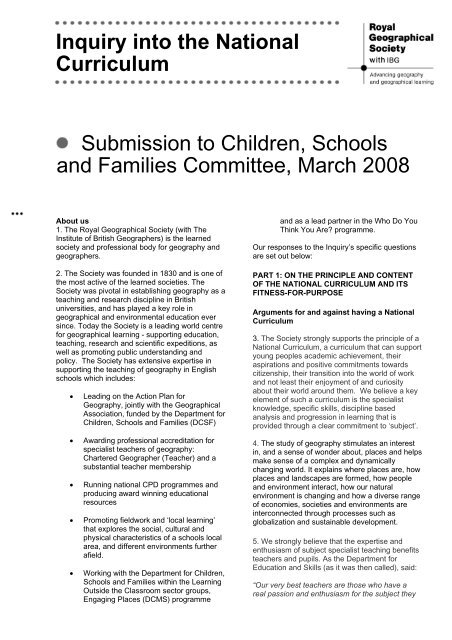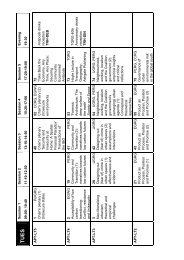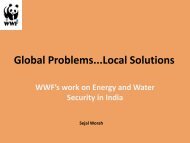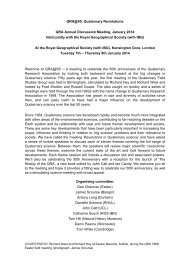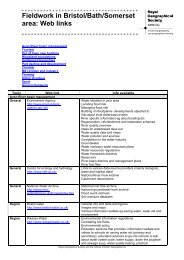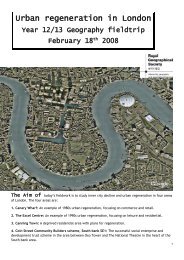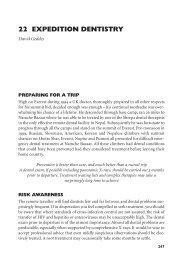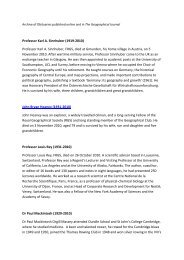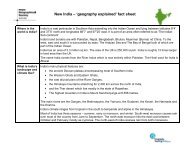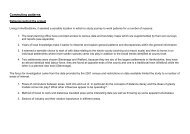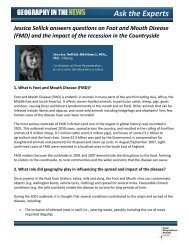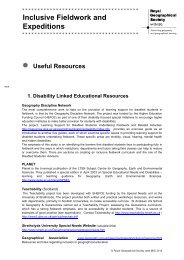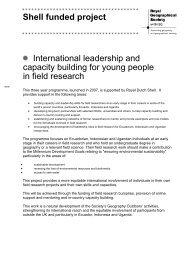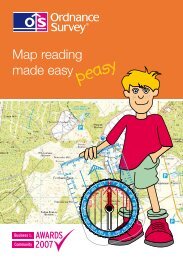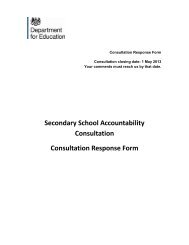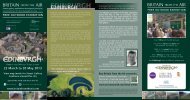Inquiry into the National Curriculum - Royal Geographical Society
Inquiry into the National Curriculum - Royal Geographical Society
Inquiry into the National Curriculum - Royal Geographical Society
You also want an ePaper? Increase the reach of your titles
YUMPU automatically turns print PDFs into web optimized ePapers that Google loves.
<strong>Inquiry</strong> <strong>into</strong> <strong>the</strong> <strong>National</strong><br />
<strong>Curriculum</strong><br />
Submission to Children, Schools<br />
and Families Committee, March 2008<br />
About us<br />
1. The <strong>Royal</strong> <strong>Geographical</strong> <strong>Society</strong> (with The<br />
Institute of British Geographers) is <strong>the</strong> learned<br />
society and professional body for geography and<br />
geographers.<br />
2. The <strong>Society</strong> was founded in 1830 and is one of<br />
<strong>the</strong> most active of <strong>the</strong> learned societies. The<br />
<strong>Society</strong> was pivotal in establishing geography as a<br />
teaching and research discipline in British<br />
universities, and has played a key role in<br />
geographical and environmental education ever<br />
since. Today <strong>the</strong> <strong>Society</strong> is a leading world centre<br />
for geographical learning - supporting education,<br />
teaching, research and scientific expeditions, as<br />
well as promoting public understanding and<br />
policy. The <strong>Society</strong> has extensive expertise in<br />
supporting <strong>the</strong> teaching of geography in English<br />
schools which includes:<br />
• Leading on <strong>the</strong> Action Plan for<br />
Geography, jointly with <strong>the</strong> <strong>Geographical</strong><br />
Association, funded by <strong>the</strong> Department for<br />
Children, Schools and Families (DCSF)<br />
• Awarding professional accreditation for<br />
specialist teachers of geography:<br />
Chartered Geographer (Teacher) and a<br />
substantial teacher membership<br />
• Running national CPD programmes and<br />
producing award winning educational<br />
resources<br />
• Promoting fieldwork and ‘local learning’<br />
that explores <strong>the</strong> social, cultural and<br />
physical characteristics of a schools local<br />
area, and different environments fur<strong>the</strong>r<br />
afield.<br />
• Working with <strong>the</strong> Department for Children,<br />
Schools and Families within <strong>the</strong> Learning<br />
Outside <strong>the</strong> Classroom sector groups,<br />
Engaging Places (DCMS) programme<br />
and as a lead partner in <strong>the</strong> Who Do You<br />
Think You Are? programme.<br />
Our responses to <strong>the</strong> <strong>Inquiry</strong>’s specific questions<br />
are set out below:<br />
PART 1: ON THE PRINCIPLE AND CONTENT<br />
OF THE NATIONAL CURRICULUM AND ITS<br />
FITNESS-FOR-PURPOSE<br />
Arguments for and against having a <strong>National</strong><br />
<strong>Curriculum</strong><br />
3. The <strong>Society</strong> strongly supports <strong>the</strong> principle of a<br />
<strong>National</strong> <strong>Curriculum</strong>, a curriculum that can support<br />
young peoples academic achievement, <strong>the</strong>ir<br />
aspirations and positive commitments towards<br />
citizenship, <strong>the</strong>ir transition <strong>into</strong> <strong>the</strong> world of work<br />
and not least <strong>the</strong>ir enjoyment of and curiosity<br />
about <strong>the</strong>ir world around <strong>the</strong>m. We believe a key<br />
element of such a curriculum is <strong>the</strong> specialist<br />
knowledge, specific skills, discipline based<br />
analysis and progression in learning that is<br />
provided through a clear commitment to ‘subject’.<br />
4. The study of geography stimulates an interest<br />
in, and a sense of wonder about, places and helps<br />
make sense of a complex and dynamically<br />
changing world. It explains where places are, how<br />
places and landscapes are formed, how people<br />
and environment interact, how our natural<br />
environment is changing and how a diverse range<br />
of economies, societies and environments are<br />
interconnected through processes such as<br />
globalization and sustainable development.<br />
5. We strongly believe that <strong>the</strong> expertise and<br />
enthusiasm of subject specialist teaching benefits<br />
teachers and pupils. As <strong>the</strong> Department for<br />
Education and Skills (as it was <strong>the</strong>n called), said:<br />
“Our very best teachers are those who have a<br />
real passion and enthusiasm for <strong>the</strong> subject <strong>the</strong>y
teach. They are also deeply committed to <strong>the</strong><br />
learning of <strong>the</strong>ir students and use <strong>the</strong>ir<br />
enthusiasm for <strong>the</strong>ir subject to motivate <strong>the</strong>m, to<br />
bring <strong>the</strong>ir subject alive and make learning an<br />
exciting, vivid and enjoyable experience.” (DfES,<br />
June 2003)<br />
6. There are a number of initiatives which, if<br />
implemented by schools in a poorly planned way<br />
can limit pupils’ access to key areas of<br />
knowledge, understanding and skills. For<br />
example, <strong>the</strong> new KS3 has been interpreted by<br />
some schools as an opportunity for dropping<br />
subject emphasis in <strong>the</strong>ir curriculum. Whilst much<br />
can be gained by well planned and developed<br />
collaboration between subjects across <strong>the</strong><br />
curriculum, its overemphasis may reduce pupils’<br />
access to <strong>the</strong> specific analytical framework and<br />
progression in learning that subjects provide.<br />
7. The Rose review of <strong>the</strong> primary curriculum also<br />
appears to be considering rolling back subjects.<br />
The Secretary of State for Children, Schools and<br />
Families has asked Sir Jim to consider if ‘pupils<br />
interests may be better served by studying fewer<br />
subjects during <strong>the</strong> primary education’ (letter<br />
Secretary of State for Children, Schools and<br />
Families to Sir Jim Rose, 9 January 2008).<br />
Ofsted has previously reported low levels of<br />
geographical teaching in primary schools and we<br />
believe such ‘integration’ would fur<strong>the</strong>r dilute <strong>the</strong><br />
opportunities for children to become curious about<br />
and engaged with <strong>the</strong> world around <strong>the</strong>m.<br />
8. A range of subjects in <strong>the</strong> <strong>Curriculum</strong> is also<br />
popular with pupils. Students have found<br />
geography useful for social and cultural<br />
awareness (Biddulph and Adey, 2003) and to<br />
‘building world knowledge’ (Norman and Harrison,<br />
2004). Research on pupils experiences of <strong>the</strong><br />
<strong>National</strong> <strong>Curriculum</strong> highlights that pupils<br />
consistently request a breadth and range of<br />
subjects and courses on offer (Lord and Jones<br />
2006). Pupils do, however, perceive ‘tested’<br />
subjects as <strong>the</strong> most important and construct<br />
relevance in terms of ‘getting a good job.’ We also<br />
recognise that <strong>the</strong>re may also be important<br />
differences across types of pupils in <strong>the</strong>ir attitude<br />
to <strong>Curriculum</strong> subjects. In a Nor<strong>the</strong>rn Ireland<br />
study, for example, ‘low-engaged’ pupils<br />
expressed concern about <strong>the</strong> over-representation<br />
of academic subjects and this seemed to<br />
contribute to <strong>the</strong>ir disengagement (Harland et al<br />
2002).<br />
9. We recognise that <strong>the</strong> <strong>Curriculum</strong> must adapt to<br />
contemporary changes – subjects do that, and<br />
offer a robust framework to deal with topical<br />
subjects such as climate change and<br />
globalisation, and its underlying principles and<br />
concepts, but within a deeper, unifying context of<br />
a discipline such as geography. Treating<br />
contemporary topics in isolation, without a<br />
rigorous grounding in <strong>the</strong> wider historical and<br />
geographical context and understanding of key<br />
principles, would provide a limited educational<br />
experience. Fur<strong>the</strong>r, it is through <strong>the</strong> <strong>Society</strong>’s<br />
reach across <strong>the</strong> schools and University context<br />
that geography teachers understanding of and<br />
approaches to key contemporary issues can be<br />
continually informed by <strong>the</strong> outcomes of cuttingedge<br />
geographical research.<br />
10. <strong>National</strong> <strong>Curriculum</strong> subjects cannot remain<br />
static. If we are to prepare young people for <strong>the</strong><br />
world <strong>the</strong>y will inhabit, <strong>the</strong> curriculum must be<br />
responsive to changes in society, <strong>the</strong> nature of<br />
work and <strong>the</strong> impact of technology. As well as<br />
building on <strong>the</strong> best of <strong>the</strong> past, it must also<br />
address contemporary challenges such as<br />
sustainability and globalization. Recent changes<br />
to geography in <strong>the</strong> <strong>Curriculum</strong> have helped to do<br />
that and reflect <strong>the</strong> thriving academic background<br />
of geography, which studies some of <strong>the</strong> most<br />
important issues facing <strong>the</strong> world today, from<br />
climate change to migration, from neighbourhood<br />
diversity to flooding.<br />
11. Geography provides an excellent vehicle to<br />
enrich <strong>the</strong> wider curriculum. Geography is well<br />
placed to make a significant contribution to <strong>the</strong><br />
current curriculum priorities of literacy, numeracy,<br />
ICT and citizenship. With regard to citizenship,<br />
geography has a vital role to play, as David Bell<br />
(<strong>the</strong>n Her Majesty’s Chief Inspector of Schools)<br />
identified in his Roscoe Lecture:<br />
“...a partnership between geography and<br />
citizenship… will energise <strong>the</strong> former and give<br />
substance to <strong>the</strong> latter. The Key Stage 3<br />
curriculum requires that pupils know about <strong>the</strong><br />
world as a global community and <strong>the</strong> role of<br />
international organisations. By <strong>the</strong> end of Key<br />
Stage 4 <strong>the</strong>y should understand <strong>the</strong> challenges of
global interdependence and responsibility,<br />
sustainable development and Agenda 21.”<br />
(David Bell, 2005)<br />
12. Geography is an ideal platform for delivering<br />
<strong>the</strong> following ‘cross-curriculum dimensions’:<br />
• identity and cultural diversity<br />
• community participation<br />
• global dimension and sustainable<br />
development<br />
• technology and <strong>the</strong> media<br />
13. A <strong>Curriculum</strong> based on subjects offers a great<br />
resource for teachers and pupils, a way to tap <strong>into</strong><br />
wider communities of academics and<br />
professionals working in particular subject<br />
disciplines such as geography. Learned societies<br />
and subject associations (such as <strong>the</strong><br />
<strong>Geographical</strong> Association) assist teachers in<br />
developing specialist subject knowledge and<br />
expertise. The RGS-IBG offer ways for teachers<br />
to be part of a wider professional and intellectual<br />
community and be part of <strong>the</strong> new<br />
professionalism. Many o<strong>the</strong>r subject<br />
organisations support <strong>the</strong>ir subjects across <strong>the</strong><br />
whole range of education from primary to higher<br />
education, such as <strong>the</strong> <strong>Royal</strong> <strong>Society</strong> for<br />
Chemistry, Institute of Physics, English<br />
Association, Ma<strong>the</strong>matical Association and o<strong>the</strong>rs.<br />
The Specialist Schools and Academies Trust also<br />
offers valuable support for subject expertise. The<br />
central question we must ask is: in which o<strong>the</strong>r<br />
areas of professional life would you expect<br />
somebody who is not a specialist to engage,<br />
teach and inspire a learner?<br />
14. In short, pupils should not expect anything<br />
less than being taught by those, particularly at<br />
secondary level, with specialist subject<br />
knowledge.<br />
15. Geography is a challenging subject and we<br />
strongly believe that it requires specialist subject<br />
knowledge to teach effectively. Ofsted survey<br />
inspections conducted between 2005 and 2007<br />
continue to show that many teachers, particularly<br />
in primary schools, are still not confident in<br />
teaching geography and have little or no<br />
opportunity to improve <strong>the</strong>ir knowledge of how to<br />
teach it (Ofsted 2008).<br />
16. For geography, <strong>the</strong> <strong>Curriculum</strong> is fit for<br />
purpose. Indeed it has recently been substantially<br />
revised at <strong>the</strong> secondary level. It is relevant,<br />
properly selective, covers key and interesting<br />
areas that should resonate with students.<br />
17. We recognise, however, that <strong>the</strong>re are some<br />
teachers who do not support <strong>the</strong> <strong>Curriculum</strong>.<br />
Head teachers have reported to us that <strong>the</strong><br />
<strong>Curriculum</strong> can be too prescriptive and stifle<br />
creativity and teacher determination of content.<br />
This is <strong>the</strong> case with some of our outstanding<br />
teachers and schools with strong subject-based<br />
expertise. It is however, our view, that overall <strong>the</strong><br />
benefits of <strong>the</strong> <strong>Curriculum</strong> far outweigh <strong>the</strong><br />
potential negatives.<br />
What <strong>the</strong> purpose of a <strong>National</strong> <strong>Curriculum</strong><br />
should be (for example, whe<strong>the</strong>r it should set<br />
out broad principles or detailed aims and<br />
objectives)<br />
18. The <strong>Curriculum</strong> should include visionary broad<br />
principles and key concepts. Guidance on<br />
detailed, concrete aims in terms of content, skills<br />
and learning outcomes should also be given. It<br />
must be relevant to students and <strong>the</strong>ir future lives,<br />
touch on key issues, develop skills, and deal with<br />
values and attitudes of students to contemporary<br />
issues, support literacy, numeracy, ICT and o<strong>the</strong>r<br />
key skills (e.g. organisational, presentational,<br />
researching and o<strong>the</strong>rs).<br />
How best to balance central prescription and<br />
flexibility at school/classroom level.<br />
19. We recommend keeping a balance of broad<br />
guidelines and exemplar materials.<br />
PART 2: ON THE MANAGEMENT OF THE<br />
NATIONAL CURRICULUM:<br />
General points about <strong>the</strong> management of <strong>the</strong><br />
<strong>Curriculum</strong><br />
20. According to Ofsted, <strong>the</strong> leadership and<br />
management of geography is weaker than for<br />
o<strong>the</strong>r subjects in primary and secondary schools<br />
in 2004/05. Many geography coordinators have<br />
significant weaknesses in <strong>the</strong>ir subject knowledge.<br />
However, in those primary schools where<br />
geography is well managed, <strong>the</strong> subject thrives
and contributes positively to <strong>the</strong> Every Child<br />
Matters outcomes (Ofsted, 2008). We are deeply<br />
concerned that some senior managers in schools<br />
seem to struggle to engage with geography and<br />
o<strong>the</strong>r non-core disciplines.<br />
21. Geography can very successfully support<br />
o<strong>the</strong>r policies and commitments in schools. It is,<br />
for example, an excellent platform to deliver<br />
educational value on global dimensions and<br />
sustainable development. It is also highly valuable<br />
for <strong>the</strong> Learning Outside <strong>the</strong> Classroom and<br />
Sustainable Schools agendas. Evidence from<br />
schools involved in <strong>the</strong> new pilot GCSE suggests<br />
that pupils value <strong>the</strong> relevance of <strong>the</strong>ir work and<br />
<strong>the</strong> links between citizenship and geography<br />
(Ofsted 2008). Unfortunately, too many schools<br />
are struggling to connect geography with <strong>the</strong>se<br />
wider policies. For example, <strong>the</strong> global dimension<br />
remains underdeveloped in <strong>the</strong> majority of schools<br />
surveyed by government inspectors (Ofsted<br />
2008). In <strong>the</strong>se cases, insufficient connections are<br />
made between <strong>the</strong> wider curriculum and <strong>the</strong><br />
geography curriculum to reinforce pupils’<br />
understanding of issues such as global<br />
citizenship, diversity, human rights and<br />
sustainable development.<br />
22. The overcrowded <strong>Curriculum</strong> and o<strong>the</strong>r<br />
policies and strategies may have undermined<br />
geography by offering competing demands on<br />
limited time in <strong>the</strong> classroom. For example, Dr Bill<br />
Boyle and Joanna Bragg, of Manchester<br />
University, have collected data for <strong>the</strong><br />
Qualifications and <strong>Curriculum</strong> Authority on<br />
timetabling since 1997. They found that junior<br />
children spent almost half of <strong>the</strong>ir week in English<br />
and maths lessons in 2006. Science occupied<br />
more than two hours and <strong>the</strong> remaining subjects<br />
have around one hour a week each (Boyle and<br />
Bragg, 2008).<br />
23. We would ask that, wherever possible, new<br />
government initiatives are delivered through<br />
subjects such as geography, and that teachers<br />
are provide with specific support to undertake this.<br />
The recent commitment to climate change<br />
teaching is one good example of a contemporary<br />
and highly relevant issue that can be successfully<br />
delivered through geography.<br />
The extent to which <strong>the</strong> <strong>National</strong> Strategies are<br />
effective in supporting <strong>the</strong> <strong>National</strong><br />
<strong>Curriculum</strong><br />
24. The <strong>National</strong> Strategies have been good for<br />
<strong>the</strong> core subjects – <strong>the</strong>y had extra funding and<br />
time to implement <strong>the</strong> literacy, numeracy and ICT<br />
strategies. They have been done in partnership,<br />
simplified and offer actionable examples,<br />
supported by resources and CPD. They have<br />
been less successful, however, for foundation<br />
subjects. For example, <strong>the</strong>y have just tended to<br />
get one school improvement officer for all ten<br />
subjects so an art specialist could easily have<br />
been advising about geography or vice versa.<br />
Ofsted has found that <strong>the</strong> Secondary <strong>National</strong><br />
Strategy has “had only a limited impact on<br />
improving geography teaching” (Ofsted 2008).<br />
Although some teachers have gained from using<br />
<strong>the</strong> Secondary <strong>National</strong> Strategy’s methodology,<br />
o<strong>the</strong>rs have adopted a rigid and formulaic threepart<br />
lesson which does not allow for spontaneity<br />
and creativity. Our information from our member<br />
teachers is that <strong>the</strong>re is a perception that <strong>the</strong><br />
national strategies have bypassed geography.<br />
The impact of <strong>the</strong> current testing and<br />
assessment regime on <strong>the</strong> delivery and scope<br />
of <strong>the</strong> <strong>National</strong> <strong>Curriculum</strong><br />
25. Foundation subjects tend to get pushed to <strong>the</strong><br />
background in Y6 as schools teach English,<br />
maths and science for <strong>the</strong> KS2 end of phase<br />
tests. We fully support <strong>the</strong> attention given to<br />
numeracy and literacy but we regret that one of<br />
<strong>the</strong> ‘unintended outcomes’ is to undermine o<strong>the</strong>r<br />
important subject areas, especially when <strong>the</strong>re are<br />
many ways, potentially, which literacy and<br />
numeracy can be taught through o<strong>the</strong>r subjects.<br />
The likely impact of <strong>the</strong> single level tests<br />
currently being piloted<br />
26. No comment.<br />
The likely impact of <strong>the</strong> current 'root and<br />
branch' review of <strong>the</strong> primary curriculum by<br />
Sir Jim Rose<br />
27. The <strong>Society</strong> looks forward to responding to <strong>the</strong><br />
primary curriculum consultation during 2008. We<br />
are, however, very seriously concerned that <strong>the</strong>
Secretary of State is considering narrowing <strong>the</strong><br />
curriculum. Namely, that ‘pupils interests may be<br />
better served by studying fewer subjects during<br />
<strong>the</strong> primary education’ (letter Ed Balls MP,<br />
Secretary of State for Children, Schools and<br />
Families to Sir Jim Rose, 9 January 2008).<br />
Reading, writing and numeracy should remain a<br />
key objective, but not at <strong>the</strong> expense of<br />
understanding <strong>the</strong> contemporary natural and<br />
human world through subjects such as<br />
geography. We also seek clarification on what <strong>the</strong><br />
request for ‘greater flexibility for o<strong>the</strong>r subjects’<br />
within <strong>the</strong> primary curriculum will entail<br />
(Paragraph 17 Children’s Plan; Building Brighter<br />
Futures, Department for Children, Schools and<br />
Families 2008).<br />
28. We also strongly recommend not combining<br />
subjects for <strong>the</strong> sake of timetable ‘convenience’ –<br />
particularly if this might compromise pupils’<br />
achievement and enjoyment. If subjects are<br />
integrated in primary schools, <strong>the</strong>y may not<br />
provide a robust learning outcome and <strong>the</strong><br />
breadth of learning young people are exposed to<br />
will suffer. Primary teachers who do not have<br />
confidence and specialist knowledge will not<br />
benefit from combining, say, history and<br />
geography.<br />
The implications of personalised learning,<br />
including <strong>the</strong> flexibility introduced by <strong>the</strong> new<br />
secondary curriculum (from September 2008)<br />
29.No comment.<br />
How well <strong>the</strong> <strong>National</strong> <strong>Curriculum</strong> supports<br />
transition to and delivery of <strong>the</strong> 14-19<br />
Diplomas<br />
30. No comment as <strong>the</strong> Humanities Diploma has<br />
yet to be developed.<br />
The role of <strong>the</strong> new style Qualifications and<br />
<strong>Curriculum</strong> Authority in relation to <strong>the</strong><br />
<strong>National</strong> <strong>Curriculum</strong><br />
31. We see no direct impact on <strong>the</strong> <strong>Curriculum</strong> of<br />
<strong>the</strong> organizational changes.<br />
The role of teachers in <strong>the</strong> future development<br />
of <strong>the</strong> <strong>National</strong> <strong>Curriculum</strong><br />
32. We believe that teachers should have an<br />
important role in <strong>the</strong> future of <strong>the</strong> <strong>National</strong><br />
<strong>Curriculum</strong> based on subject expertise and in<br />
doing so work in partnership with subject bodies<br />
that bring expertise in developing subject content<br />
and pedagogy.<br />
33.Training and professional development should<br />
be encouraged and we strongly endorse <strong>the</strong><br />
commitment to professional development of<br />
teachers encouraged by <strong>the</strong> Training and<br />
Development Agency for Schools. The <strong>Society</strong><br />
has established <strong>the</strong> nationally accredited<br />
Chartered Geographer status for teachers and<br />
o<strong>the</strong>r geography professionals. Many o<strong>the</strong>r<br />
learned societies, subject bodies and professional<br />
organisations are providing similar accreditation<br />
for teachers and we welcome this development in<br />
teachers’ knowledge and skills which we believe<br />
will have tangible benefits to <strong>the</strong> quality and<br />
standards of education in schools.<br />
REFERENCES<br />
Bell, David (2 November 2005) ‘Education for<br />
democratic citizenship’, Roscoe Lecture, Liverpool<br />
Biddulph, M. & Adey, K. (2003). ‘Perceptions v.<br />
reality: pupils’ experiences of learning in history<br />
and geography at key stage 4’, The <strong>Curriculum</strong><br />
Journal, 14, 3, 291–303<br />
Boyle B. & Bragg J. (2008) ‘Making Primary<br />
Connections – <strong>the</strong> cross curriculum story’,<br />
<strong>Curriculum</strong> Journal, Vol 19, No 1 pp 5-21.<br />
Department for Children, Schools and Families<br />
(2008) Children’s Plan; Building Brighter Futures<br />
Department for Education and Skills (2003)<br />
Subject Specialism<br />
Harland, J., Moor, H., Kinder, K. & Ashworth, M.<br />
(2002). Is <strong>the</strong> <strong>Curriculum</strong> Working? The Key<br />
Stage 3 Phase of <strong>the</strong> Nor<strong>the</strong>rn Ireland <strong>Curriculum</strong><br />
Cohort Study. NFER.<br />
Lord, P & Jones, M (May 2006) ‘Pupils’<br />
experiences and perspectives of <strong>the</strong> national<br />
curriculum and assessment: final report for <strong>the</strong><br />
research review.’ Qualifications and <strong>Curriculum</strong><br />
Authority
Norman, M. & Harrison, L. (2004). ‘Year 9<br />
students’ perceptions of school geography’,<br />
Teaching Geography, 29, 1, 11–15<br />
Ofsted (2008) Geography in Schools; Changing<br />
Practice<br />
<strong>Royal</strong> <strong>Society</strong> for <strong>the</strong> Arts (2005) How Special Are<br />
subjects? Are They The Best Way To Structure A<br />
<strong>Curriculum</strong> Or Can We Do Better?<br />
.


